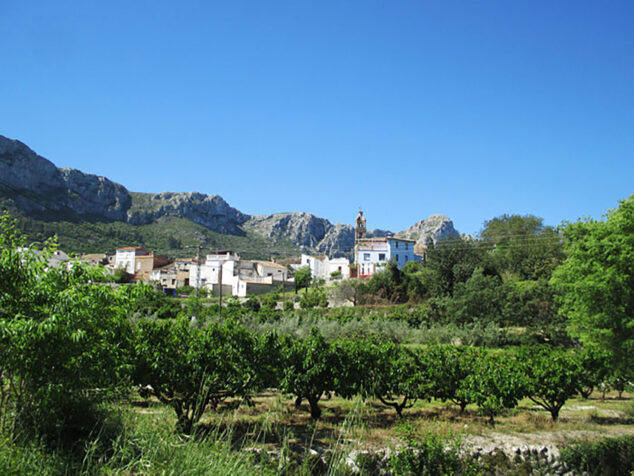The province of Alicante has a significant production of cherries, highlighting the area protected by the Protected Geographical Indication "Cireres de la Muntanya d'Alacant" in Alpatró, the Vall de Gallinera, created in 1991. In this area, the Valls de la Marina Alta (the Vall d'Ebo, the Vall d'Alcalà, the Vall de Gallinera and the Vall de Laguar), Planes and Benimarfull offer ideal agroclimatic conditions for the cultivation of cherry trees thanks to their mountainous relief and proximity to the coast, which that allows to obtain early and excellent quality cherries.
The cultivation of cherries is one of the most established and traditional in this geographical area of the Valencian territory, cultivated on many occasions on family farms.
In addition, it must be taken into account that the agricultural production of the Valls is marked by small farms and dry stone terraces located in an orography that makes the daily work difficult for so many families who have worked this crop since time immemorial, in some municipalities marked by the increase in the last years of a notable depopulation.
The average annual cherry production in the Cooperativa Cireres Muntanya d'Alacant, for example, ranged in normal production years between 500.000 kg and 800.000 kg of predominant varieties such as Burlat, Early Lory, Prime Giant, Stark Hardy Giant , Picota Ambrunesa and Sweet Heart.
In the last five years, the cherry has been affected by the weather and this has caused a notable drop in production. The year 2018 was a standard production season and in Cireres Muntanya d'Alacant COOP CV a total of 700.000 kg were collected, while in 2019 some 200.000 kg were collected and in 2020 it was 28.000 kg, in 2021 107.000 kg were collected and in 2022 about 4000 kg were collected.
As for 2023 and as an exceptional case, it will close its doors to the public after more than 40 years of operation due to the zero cherry production in the north of the province of Alicante.
The climate change scenario in this territory marks different conditions:
- Abnormally long periods of rain, as is the case in March 2022 in the Vall de Gallinera, which accumulated 927 liters in 14 consecutive days of rain.
- Accumulation of cold hours in unfavorable periods, such as the transfer of the accumulation of cold hours to the months of January and February, when it really should be concentrated in November and December for a greater viability of the crop.
- Sudden variations in temperature that during the flowering season impair pollination.
Regarding the scenario of cherry production in this orography of smallholdings, it has these conditions:
- High production costs: it is estimated that a hectare of cherry cultivation, in this part of the territory, has an annual cost of €8500, which would be €708 per fanegal of annual cost.
- The non-adaptation of the yield insurance coverage to this territory of smallholdings: despite having the same insurance cost, having declared claims for 5 consecutive campaigns due to lack of harvest leads to reductions of up to 50% of the insured production.
- The appearance of a new pest, such as Drosophila suzukii, which causes great damage to the harvest, the main problem being the ignorance of treating it by a large part of the producers and the little technical support from the official services of the Generalitat Valenciana.
- Maladaptation of current varieties in this context of climate change.
- Erosion problems due to lack of maintenance of the dry stone margins that maintain the cultivation terraces, the lack of profitability of the farms prevents the maintenance of these infrastructures.
- Abandonment of a large part of the cultivation plots that causes the spread and makes it difficult to control forest fires.
These problems, dragged on for more than 10 years, add to the past fire in the municipalities around the Vall d'Ebo last summer, where a large part of the crops were destroyed, thus aggravating cherry production. And which possibly will not be recovered since the present crop is increasingly unfeasible.
With these two scenarios, intertwined with each other, the agrarian panorama in these small towns in danger of depopulation in the north of the province of Alicante, make a desperate call to the Generalitat Valenciana to resolve:
- Relevant aid adapted to the producers of this geographical area that can favor the sustainability of production and the immediate economic recovery of this crop that has been subjected to a continuous catastrophe for the last 5 years, in addition to aid aimed at maintaining the stone dry of the margins to avoid the erosion of the land and the abandonment of the crop.
- Adaptation of insurance to the peculiarities of the territory.
- Technical research by official services to adapt new varieties to continuous climate change.
- Technical investigation by official services to control new pests.
Agricultural heritage is clearly the main economic pillar that sustains these municipalities, and other socioeconomic factors that affect the rural world depend on this sector: sustainable tourism, population density, maintenance of minimum services... It is evidence that if urgent and forceful measures are not taken in agriculture, it is doomed to disappear and with it, the towns of the rural environment.
The different municipalities affected call on the State Public Administrations to declare this point of the territory as an area seriously affected by a civil protection emergency, which amounts to a catastrophic area and also grant the relevant aid to alleviate the abandonment of the crop.







